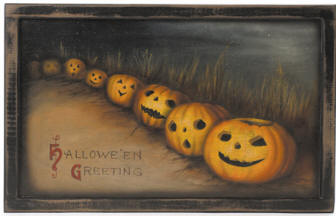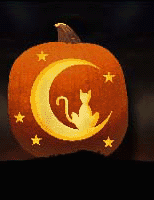|
 The Jack-O-Lantern has been such
a part of our life for what seems so long, it seems as American as apple
pie. However, it was actually the Irish who brought what we know as the
Jack-O-Lantern to America. The Jack-O-Lantern has been such
a part of our life for what seems so long, it seems as American as apple
pie. However, it was actually the Irish who brought what we know as the
Jack-O-Lantern to America.
But, why name a carved squash
after a person named Jack? Who was this Jack anyway? According to legend
and lore, Jack was a legendary, stingy drunkard. He tricked the Devil
into climbing an apple tree to get him a juicy apple and then quickly
cut the sign of the cross into the tree trunk, preventing the Devil from
coming down. Jack made the Devil swear that he wouldn't come after his
soul in any way. The Devil promised. However, this did not prevent Jack
from dying - on All Hallow's Eve.
When he arrived at the gates of
heaven, he was turned away because he was a stingy, mean drunk.
Desperate for a resting place, he had the nerve to go to the Devil. The
Devil, true to his word, turned him away. "But where can I go?" pleaded
Jack. "Back where you come from," spoke the Devil. The night was dark
and the way was long, and the Devil tossed him a lighted coal from the
fire of Hell. Jack, who was eating a turnip at the time, placed the coal
inside and used it to light his way.

Since that day, he has traveled
the world over with his Jack-O-Lantern in search of a place to rest.
Irish children carved out turnips and potatoes to light the night on
Halloween. However, when the Irish came to America in great numbers in
the 1840s, they found that a pumpkin made an even better lantern, and so
this "American" tradition was born.
There are several variations
on the legend which we've included below:
-
The Devil mockingly
tossing a coal from the fires of Hell at Jack, which Jack then
places in the turnip.
-
Jack tricking/trapping
the Devil a variety of ways, including placing a key or other item
in the Devil’s pocket when the Devil is suspended in the air or
plucking an apply from a tree. Some versions include a “wise and
good man” or even God helping Jack prevail over the Devil.
-
Jack’s bargain with the Devil being
different. In some translations, the deal is only a temporary
bargain, but the Devil, embarrassed and vengeful, refuses Jack entry
after Jack dies.
-
Jack is considered a greedy man and is not
allowed into either Heaven or Hell, without anything having to do
with the Devil.
Despite the colorful tales
and legends, the term jack-o’-lantern originally meant a night watchman,
or man with a lantern, with the earliest known use in the mid-17th
century; and later, meaning an ignis fatuus or will-o-the-wisp.
^ back to top
 Pumpkins with Attitude! Pumpkins with Attitude!
 Jack-o-Lanterns are often
carved with an expressive face. Scary or whimsical, depends on the
carver. Just be creative! Sections of the pumpkin are cut out to make a
design, often depicting a face: eyes, nose and mouth. A variety of tools
may be used to carve and hollow out your pumpkin – from simple kitchen
knives and spoons to specialized instruments. It is possible to create
truly artistic designs these days with the help of design patterns sold
in stores. After carving the pumpkin, a light source, usually a candle,
is placed inside the now carved pumpkin. Placing the top back on its
head, the light will illuminate the design from inside. It is best to
carve some holes in the lid to allow the heat to escape. Jack-o-Lanterns are often
carved with an expressive face. Scary or whimsical, depends on the
carver. Just be creative! Sections of the pumpkin are cut out to make a
design, often depicting a face: eyes, nose and mouth. A variety of tools
may be used to carve and hollow out your pumpkin – from simple kitchen
knives and spoons to specialized instruments. It is possible to create
truly artistic designs these days with the help of design patterns sold
in stores. After carving the pumpkin, a light source, usually a candle,
is placed inside the now carved pumpkin. Placing the top back on its
head, the light will illuminate the design from inside. It is best to
carve some holes in the lid to allow the heat to escape.
 Traditionally the carved
pumpkin would be a face, often with a simple crooked toothed grin. But
toward the end of the 20th century, artists began expressing themselves
a bit more elaborately. Today, it is common to see portraits of famous
people – politicians, celebrities or cartoon figures grace today’s
jack-o-lanterns. Some artists do full three-dimensional sculptures and
others work with the idea that the lighted pumpkin will project in what
amounts to three shades. Traditionally the carved
pumpkin would be a face, often with a simple crooked toothed grin. But
toward the end of the 20th century, artists began expressing themselves
a bit more elaborately. Today, it is common to see portraits of famous
people – politicians, celebrities or cartoon figures grace today’s
jack-o-lanterns. Some artists do full three-dimensional sculptures and
others work with the idea that the lighted pumpkin will project in what
amounts to three shades.
From Pumpkin to Jack-o-Lantern: Carving Basics
The Legend of the Jack-O-Lantern....
^ back to top
|

